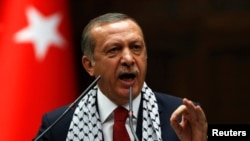Turkey’s prime minister has been criticizing U.S. policies in the Middle East, particularly regarding the conflict in Syria and fighting between Israel and Palestinians in the Gaza Strip. Analysts say tension between Washington and Ankara comes at a time when the two allies must cooperate to confront the growing threat by Islamic extremists.
Prime Minister Recep Tayyip Erdogan's comparison of the Israel military operation in Gaza to Hitler is further straining relations with Washington.
Since Erdogan’s crackdown last year on anti-government protests, his once-close relationship with President Barack Obama has soured, according to political columnist Asli Aydintasbas of the Turkish newspaper Milliyet. But Aydintasbas said Erdogan’s anti-Israel rhetoric marks a new low in relations.
"Erdogan’s rhetoric, invoking such images as Hitler when criticizing Israel, is rather unacceptable in United States. Right now, from what I can observe, the U.S. policy is no personal one-on-one contact between President Obama and Tayyip Erdogan. That is quite a contrast to 2011, 2012, when they would talk every month, I believe it was 11 conversations in 2012," said Aydintasbas.
Erdogan, in a recent interview, acknowledged he no longer has any personal contact with President Obama. The Turkish prime minister has dismissed criticism from U.S. officials, however, and said they should engage in self-criticism for statements supporting Israel’s right to self-defense.
On Monday, State Department deputy spokesperson Marie Harf said Turkey is paying a price for what she called its "horribly anti-Israeli comments."
"I think that there is no place in international dialogue for those kind of comments, period," she said. "And that we stand up and are very clear in saying that when people do say those kind of things, and again, it only hurts Turkey's standing in the world, only hurts their ability to influence events when they say things like that."
But with Turkey being a NATO member and sharing borders with Iran, Iraq and Syria, analysts say Ankara remains an important U.S. ally.
Columnist Aydintasbas says cooperation is continuing at diplomatic levels and between Turkish Foreign Minister Ahmet Davutoglu, and his U.S. counterpart, John Kerry.
"Certainly they [the U.S.] need Turkey, especially when there is a huge U.S. base in Incirlik that is critical, especially with everything that is going on in Iraq, and the U.S. does need Turkey when combating regional threats," said Aydintasbas.
Analysts say the United States and European countries are looking to Turkey for cooperation, in particular on containing the threat of their nationals joining jihadist groups fighting in Iraq and Syria.
A visiting scholar at Carnegie Europe in Brussels, Sinan Ulgen, says much of Erdogan’s tough rhetoric against Israel and the United States could well be part of campaign efforts to rally his religiously conservative grassroots voters before next month’s presidential election.
"If he is elected president he will try to improve his international image, an image which was tarnished over the past year essentially. I think he has leverage on this and he will have the opportunity to win back some of the trust that he lost in the past year, in terms of his international standing," said Ulgen.
Other political observers warn the nature of some of Erdogan’s rhetoric aimed against Israel is likely to make that task difficult. But at the same time, the strategic importance of Turkey is likely to give Erdogan a strong diplomatic hand.











